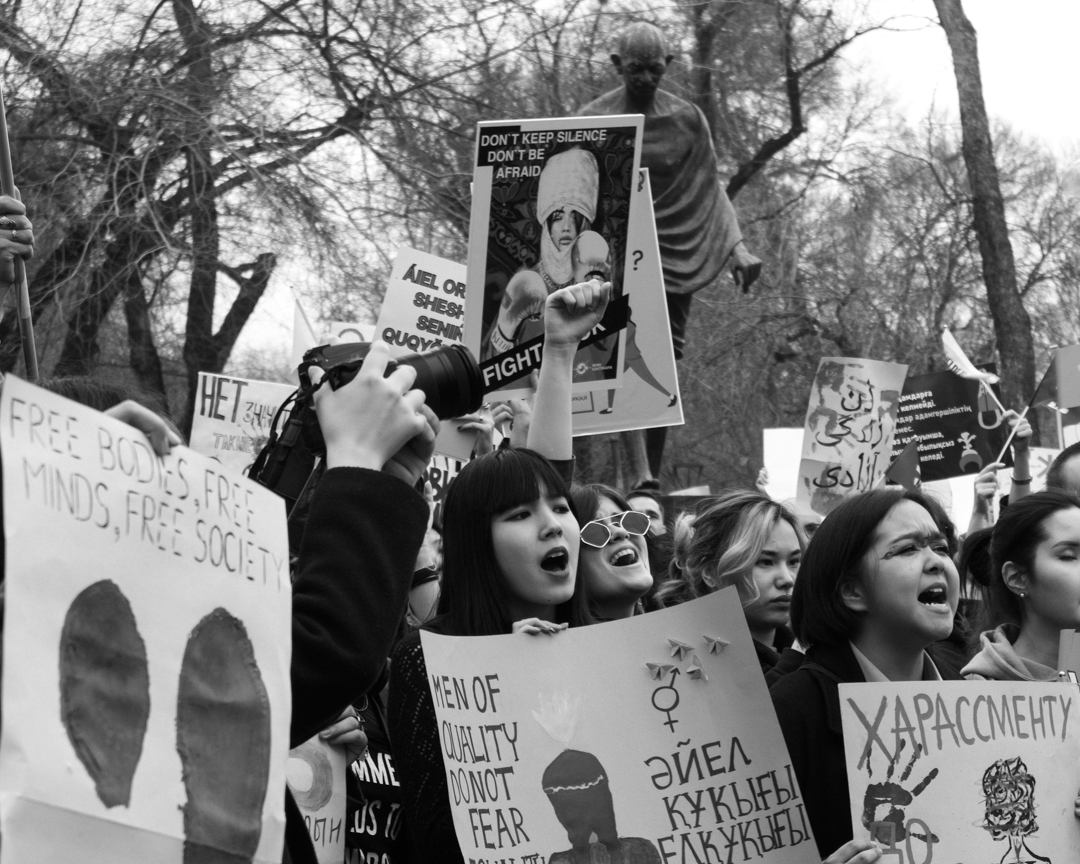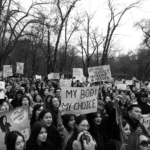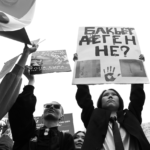On Women’s Day in Kazakhstan – women campaign against sexual violence
Women’s Day in Kazakhstan: hundreds gather for rally in Almaty
Published by Novastan.org
9 March 2023
On International Women’s Day in Almaty, feminist organisations rallied “for bodily autonomy and against sexual violence”. According to estimates, 700 to 1000 participants joined the rally to express their demands. After facing an initial ban by the city administration, the organisers only received limited permission to assemble on a distant location in the city’s outskirts.
The rally opened with a moment of silence in memory of those killed by domestic violence. The situation with violence against women in Kazakhstan is alarming: in 2021, 110 women were killed as a result of domestic violence. In 2022, there were 373 rapes registered in Kazakhstan; so far in 2023 72 cases of sexual violence have been reported. According to official sources, more than 100 000 domestic violence complaints are received by the authorities annually.
Human Rights Watch has repeatedly insisted upon greater accountability for abusers. Recently, Human Rights Watch again called for Kazakhstan to “ensure that draft laws relating to domestic violence provide maximum protection for women from family violence, including by criminalising domestic violence as a stand-alone offense“. A draft law On Combating Domestic Violence, which would have strengthened protections for victims of family abuse, passed its first reading in parliament in 2020, but was withdrawn in 2021 as it was said to be in need of improvement.
Activists also voiced a demand to pass a bill on sexual harassment and to join the Istanbul Convention. This international agreement was initiated by the Council of Europe to end violence against women and domestic violence. Since the withdrawal of the draft law, state officials have submitted several revisions; HRW claims the authorities proposed “at least two other pieces of legislation that include domestic violence-related provisions”, but the new draft is unavailable for public discussion.

Long way to a march in March
In 2017, the first feminist march took place in Almaty. Back then, the activists had not received a permit from the city administration. In 2019, for the first time, the authorities officially approved a feminist rally and then a feminist march. But in 2020, the organisations FemAgora, KazFem and Feminita were denied permission to organise a march on March 8.
In 2021, the Almaty city council approved the largest feminist march in Kazakhstan to date. Between 500 and 1000 participants marched about five kilometres through the streets of the city. Last year, the Almaty Women’s March was only allowed at the last moment.
Fariza Ospan, one of the organisers of the 2023 Almaty women’s march, says the organising committee applied for approval four times before permission was finally granted: the first time in December 2022. The municipality then banned the march because of an event of the League of Volunteers, a quasi-public organisation which became famous in 2018 as they campaigned in support of a controversial state project to build a ski resort in a national park (and won several questionable public contracts). Ospan says the organisers suspect that the city council had already decided to ban the march even before any application was submitted, as all demonstration sites were allegedly booked by the League of Volunteers.
During a Q&A with citizens in February, Almaty’s Mayor Erbolat Dosaev said “We’ll see what we give permission for and what we don’t,” when the activists asked him if the march was going to be approved, and added that “the 8th of March is a holiday that is important for men as well“. The same day, the organisers of the women’s march were notified that their rally would not receive municipal permission.
As Ospan explains, this was anticipated: the organisers had planned to protest the ban every weekend until permission was granted. The first protest took place on 5 February, when more than 150 people gathered to voice their discontent with the administration’s decision.
The difficulty of organising demonstrations in Kazakhstan
In 2020, Kazakhstan’s Parliament passed the Law “On Peaceful Assemblies,” according to which it is sufficient to inform local authorities of a planned demonstration, without obtaining explicit permission to organise one. However, this law is heavily criticised by civil society for violating the right of peaceful assembly, as the procedure to notify the authorities is actually more complicated than it might seem.
In Almaty, there are three locations where the citizens are allowed to peacefully assemble, with the capacity for 200, 500, and 1000 participants, and only one possible route for a march. The largest location is in the city centre, although it is rather far away from the city administration buildings. The other two are located in residential neighbourhoods on the city’s outskirts. But even the latter locations are often unavailable for various reasons, such as repair works or other events. In 2019, an activist was finally permitted to hold a rally, after his request had first been rejected 35 times. Although the law has been updated since, the grounds for the municipality to ban protests have not.
According to Kazakh law, an application to hold a demonstration is non-binding. It means that even if a rally is cancelled in advance, the city hall is not obliged to inform other potential applicants that the location has become available. This lack of transparency makes it difficult to keep the local government in check, while it allows the municipality to ban genuine initiatives.
Even if organisers are notified that a location is vacant, this often happens with little time left to prepare. In Kazakhstan, those planning a demonstration are responsible for anything that could go wrong, creating yet another obstacle for activists to overcome. For example, if the number of participants specified in the application is exceeded or the agenda changes, organisers could be sanctioned.
Limited permission granted
As Fariza Ospan explains, in February, the city council communicated that the League is ready to “give up two locations“. The Women’s March organising committee hoped to secure a location next to Shoqan Walikhanov’s monument in downtown Almaty, where up to 1000 people could gather. But this could not be facilitated. The activists could choose between two distant locations and finally applied to organise a gathering at the Ghandi Park with a capacity of 200 people.
On 21 February, the organising committee of the Almaty women’s march learned from an article by news outlet Orda.kz that their rally was finally allowed to take place. The official approval from the city administration came in the evening. Yet, the ban to march through the city was left in place and the organisers decided not to proceed with it to avoid putting the participants in danger.
The turn-out exceeded expectations. Local news outlets have come with various estimates: from “up to 700″ to “at least 1000“. All difficulties aside, this year’s rally in Almaty once again showed that the 8th of March has become an annual tradition for the women’s movement in Kazakhstan − and it is likely here to stay.
Written by Anna Wilhelmi, Emma Collet
Edited by Julian Postulart
Photos by Toma Maratova
Women’s Day in Kazakhstan: hundreds gather for rally in Almaty





